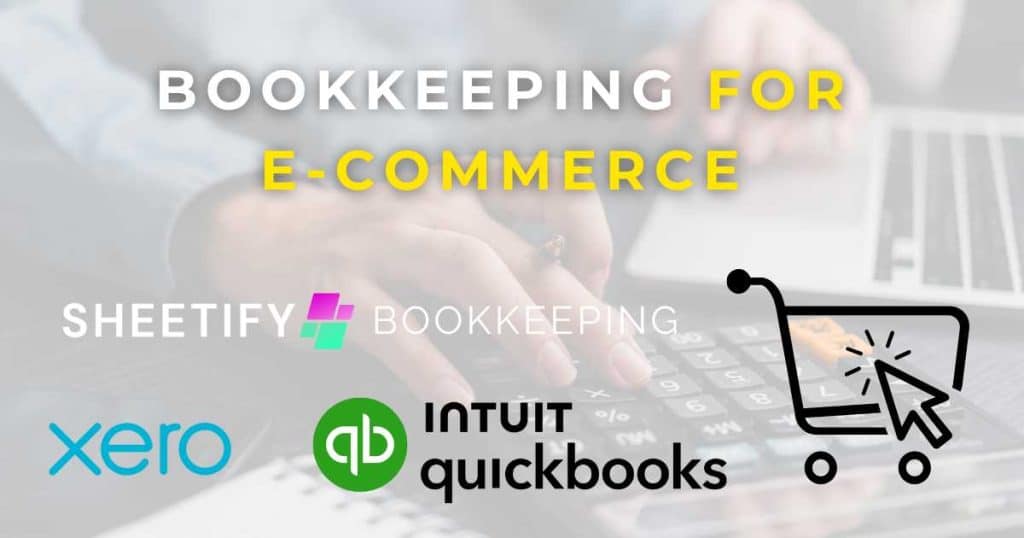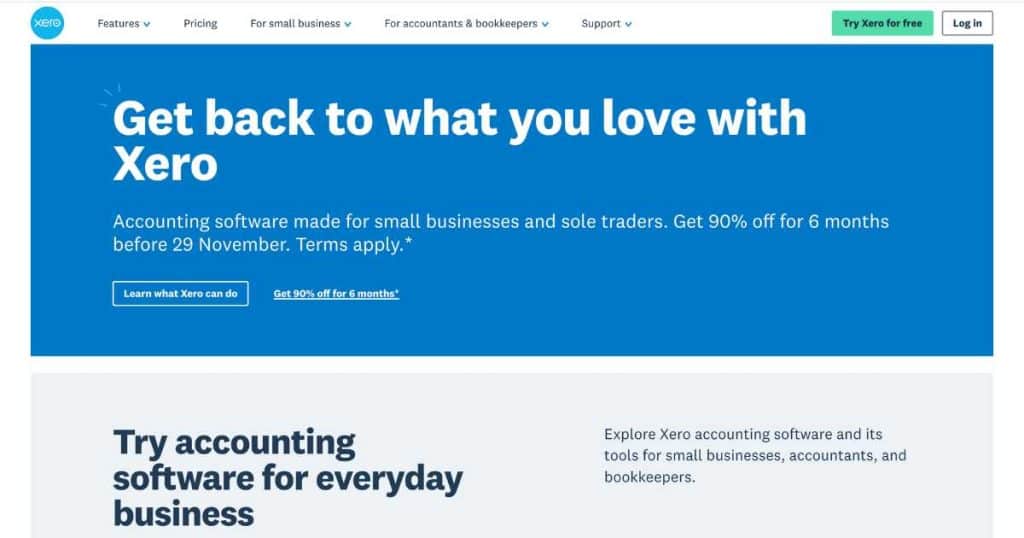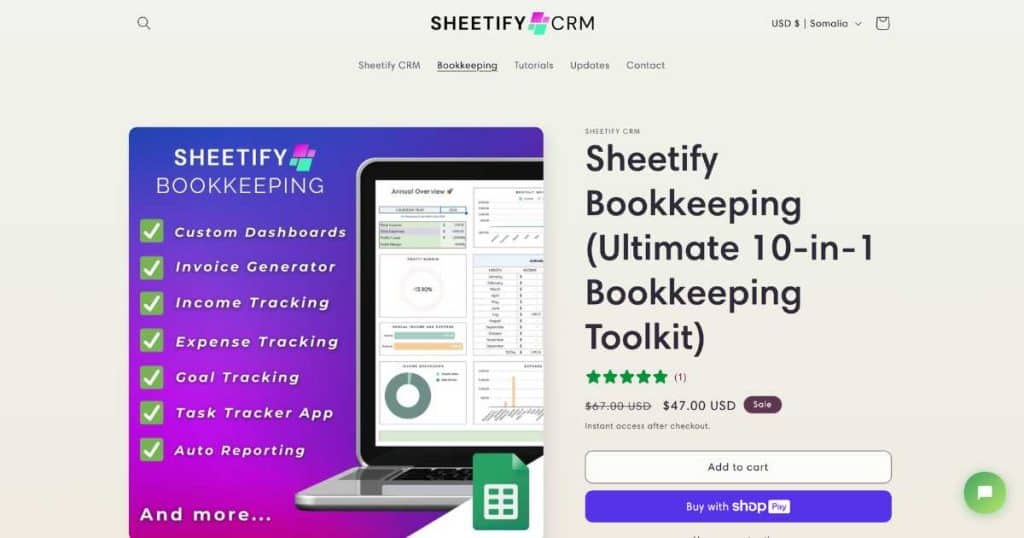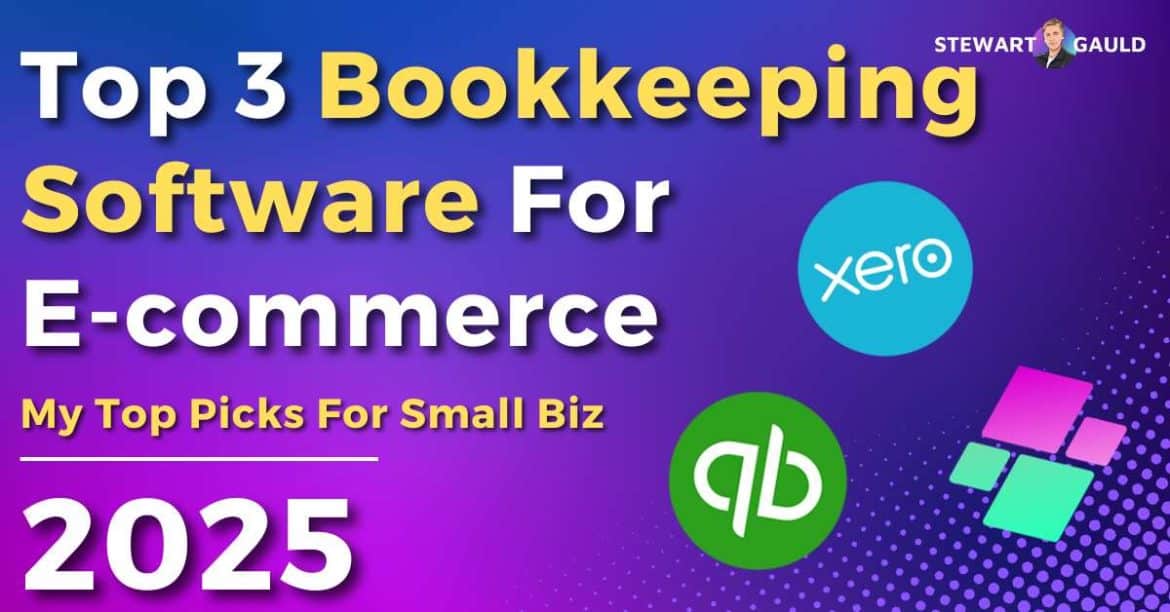What are the top 3 Bookkeeping software for e-Commerce brands?
Attention all eCommerce businesses! Are you ready to revolutionize how you manage your cash inflows and outflows?
If you’re struggling to keep up with the financial side of your eCommerce business, it’s time to consider using an efficient bookkeeping software.
Bookkeeping software is an essential tool that can help you run and sustain your online store efficiently.
But with so many bookkeeping solutions available today, how do you determine which one is the best fit for you?
This is where I step in! I’m bringing you my top 3 bookkeeping software tailored for eCommerce brands.
So, what are the top 3 bookkeeping software for eCommerce?
Read more: My Top 10 Online Tools For Small Business.
Top 3 Bookkeeping Software For E-commerce

My top 3 bookkeeping software for eCommerce businesses are:
1. Xero
2. QuickBooks
All three platforms mentioned above are easy to use and offer features tailored to the demands of online stores.
The hardest question is: which do you pick?
Well, luckily, I’m here to help. I’ll explore all three platforms’ features, pricing, strengths, weaknesses, and more to determine the best choice for you and your eCommerce brand.
With that said, let’s dive into the top 3 bookkeeping software for eCommerce now.
What Is Bookkeeping Software For E-commerce?
Bookkeeping software is an online tool that can help small businesses track and manage their income and expenses efficiently.
Typically, bookkeeping software can also generate invoices, manage accounts payable and receivable, and provide reports that offer insights into the business’s financial health.
But for brands within the eCommerce sector, finding a bookkeeping tool that also comes with inventory management, tax calculations, and eCommerce integrations is essential.
Luckily, there are three top eCommerce bookkeeping solutions that stand out from the crowd.
So, what are the best bookkeeping software for eCommerce businesses?
Best Bookkeeping Software For E-commerce
1. Xero

Best for growing eCommerce teams.
Xero is a cloud-based bookkeeping and accounting solution tailored for small and medium-sized businesses.
Originally established in New Zealand in 2006, Xero has evolved into a globally acclaimed accounting solution available in more than 180 countries worldwide!
With a web and mobile application, businesses have the opportunity to effectively monitor their expenses, income, invoices, and other financial activities on the go.
And its clean, user-friendly interface allows individuals to effortlessly manage their finances regardless of their experience level!
Xero E-commerce Features
With Xero, you can easily manage and track your income and expenses, create invoices, generate reports and expense claims, pay employees, manage inventory, and more
It’s also possible to automate various eCommerce accounting tasks like invoicing, managing bills and vendors, and bank reconciliations.
Additionally, generating reports that offer valuable insights into aspects like sales, expenses, inventory, and cash flow can be done in a blink of an eye.
And thanks to the impressive multi-currency support feature, you can quickly and accurately keep on top of your revenue and payments in different currencies without a second thought.
This makes Xero the perfect bookkeeping software for eCommerce businesses operating in the global marketplace!
But what truly sets Xero apart is its robust integration capabilities, allowing you to connect seamlessly with over 1000 third-party apps.
Amongst those integrations are many popular eCommerce platforms such as Shopify, Magento, and WooCommerce.
Essentially, you can automatically sync your online store platform’s transactions, sales, and inventory data with Xero daily, reducing the time spent on manual data entry.
With its emphasis on simplicity, efficiency, and integrations, it’s no surprise why Xero is a favorite amongst both eCommerce and service-based teams globally.
Read my updated Xero Review here
Xero Pricing
Xero’s pricing plans differ depending on your location. However, Xero’s USA pricing plans are (November 2024):
- Early: $15 USD monthly: Best for sole traders, new businesses, or individuals.
- Growing: $47 USD monthly: Best for growing small teams.
- Established: $80 USD monthly: Best for more established teams.
Xero also offers a generous 30-day free trial for all new accounts!
Want to learn more about Xero’s pricing structure?
Check out my article here that breaks down all of Xero’s pricing plans and current discounts
2. QuickBooks

Best for eCommerce teams focused on tax management and advanced reporting capabilities.
Since its launch in 1992, QuickBooks (a product of Intuit) has consistently been one of the most popular bookkeeping and accounting solutions for small business.
Originally developed as a desktop accounting and bookkeeping software, QuickBooks has since evolved into QuickBooks Online, a cloud-based variant of the original program.
QuickBooks delivers features comparable to Xero’s, including sales tracking, customer account management, payroll services, and report generation.
QuickBooks E-commerce Features
QuickBooks is an indispensable tool for eCommerce businesses.
You can easily create and send invoices, sales receipts, and purchase orders for your eCommerce products with QuickBooks.
And with its bill management capabilities, businesses can effortlessly track and settle bills, manage vendor information, and maintain control over payments.
The software provides payroll functionality for eCommerce businesses with multiple staff members, including calculating employee wages, pay stubs, and preparing taxation forms.
QuickBooks also automatically calculates sales tax based on the location of the customer’s address within the invoice (without any help from third-party integrations!)
Additionally, every user receives expert live tax help to assist with year-end tax filing for your eCommerce brand–how impressive is that??
Like Xero, QuickBooks also supports multiple currencies, so you don’t have to worry about exchange rate conversions again!
QuickBooks inventory management tools also help monitor your inventory levels and manage stock items.
Plus, you’ll even get automatic alerts when your inventory is running low! This is imperative to ensure you never run out of stock for your customers.
Beyond these functional advantages, a standout feature is their comprehensive and customizable reports that can analyze P&L statements, balance sheets, and more.
Additionally, QuickBook’s ability to integrate with leading eCommerce platforms, payment gateways, and shipping providers ensures efficient data synchronization.
From PayPal to Etsy, Amazon, Square, and Shopify, simply import your orders and payout details from different sales channels to clearly show your earnings and spendings.
This makes QuickBooks the perfect bookkeeping solution for eCommerce teams looking to efficiently manage, streamline, and synchronize their data across different platforms.
Read my in-depth Xero vs QuickBook comparison here
QuickBooks Pricing
- Simple Start: $35 per month.
- Essentials: $65 per month.
- Plus: $99 per month.
- Advanced: $235 per month.
All plans also come with a 30-day trial, including free expert help for the first 30 days, available to all new QuickBooks users!
3. Sheetify Bookkeeping

Best for small and micro eCommerce business owners.
Sheetify Bookkeeping is an affordable, easy-to-use Google Sheets bookkeeping template specifically designed for small and micro businesses that already use Google Sheets.
Basically, Sheetify Bookkeeping leverages the simplicity and familiarity of Google Sheets to provide a robust financial management platform!
How does it work, you ask?
The platform’s user-friendly design includes custom formulas, prearranged headers, neatly organized sheets, and an embedded Apps Script.
This ensures even those new to bookkeeping can manage their finances with ease.
So, how can eCommerce brands take control of their financial activities from within Google Sheets?
Sheetify Bookkeeping E-commerce Features
With Sheetify Bookkeeping, you can easily track your income and expenses, generate invoices and quotes, monitor goals, and create and send financial reports.
And with Sheetify’s automatic tax calculator, you can view how much tax you actually need to pay on your income and expenses.
This, along with the ‘Add new records’ and ‘Scroll down’ tool (where you can scroll down to the last entry in one click), is crucial for online stores with many outgoings and ingoings!
Sheetify Bookkeeping is also highly versatile, allowing you to seamlessly set up your Google template in a way that suits you and your business.
All you need to do is add your preferred currency, profit goals, income and expense categories, and more, and you’ve got a unique bookkeeping solution tailored to your brand.
This means Sheetify Bookkeeping is not just limited to eCommerce businesses!
Unlike QuickBooks and Xero, Sheetify Bookkeeping doesn’t have a specific inventory management sheet.
However, Sheetify CRM does! I highly recommend using Sheetify Bookkeeping and Sheetify Bookkeeping together to manage all aspects of your eCommerce business.
It’s important to note that Sheetify Bookkeeping also doesn’t integrate directly with Shopify, WooCommerce, or other online store platforms.
In saying that, Sheetify Bookkeeping is the best simplistic bookkeeping tool for small eCommerce businesses after a straightforward way to take control of their finances.
Read more about Sheetify Bookkeeping for Google Sheets here.
Pricing
Unlike most bookkeeping software (including the other two on this list!), Sheetify Bookkeeping is available for just one payment of $47.
You read that right! There are no hidden costs or monthly subscription fees involved, just lifetime features and updates for you and your eCommerce team.
Additionally, if you purchase Sheetify Bookkeeping and Sheetify CRM together, you’ll receive a 15% combo discount.
And if you’re after a personalized bookkeeping approach, Sheetify Bookkeeping additionally provides bespoke package services tailored to your online store requirements.
What Is The Best Bookkeeping Software For You?

For eCommerce brands, selecting the right bookkeeping software can prove to be a daunting task.
Fortunately, every bookkeeping software option mentioned above is an excellent choice.
So, with that said, which should you pick?
Sheetify Bookkeeping is the best choice for small eCommerce teams looking for a simple and fundamental Google Sheets bookkeeping solution.
Xero is a comprehensive cloud-based bookkeeping and accounting solution that caters to the growth and scalability needs of eCommerce businesses.
Meanwhile, QuickBooks shines for online stores seeking a software solution with substantial tax support and extensive reporting capabilities.
My advice? Take the time to consider your business needs, goals, and priorities, and pick the software that best aligns with your business.
Stews Final Thoughts
We have now concluded our guide on the top 3 bookkeeping software for eCommerce businesses.
So, which one is the ideal fit for your online store? The answer to that will depend on your specific needs and preferences.
Remember that only one or two of these solutions will truly match the unique requirements of your eCommerce operations.
It’s worth noting that the software options discussed offer user-friendly interfaces and free trials or affordable pricing plans.
So, what are you waiting for? It’s time to take charge of your business finances now!

